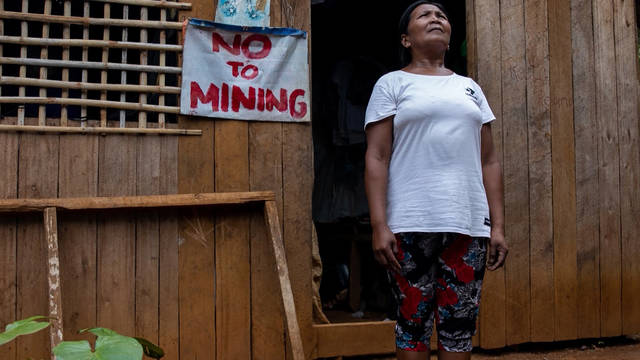
By Amy Goodman & Denis Moynihan
A hurricane walloping Louisiana, wildfires scorching California and Greece, floods and landslides in Southeast Asia: impacts of the worsening climate emergency are everywhere, and scientific evidence that human activity is the principal driver of the destruction is rejected by only the most hardened climate change deniers. Formal negotiations to address the crisis are proceeding, but aren’t happening fast enough. The planet is at a tipping point, on the verge of climate destruction accelerated by irreversible feedback loops. Climate activists are increasingly engaging in non-violent direct action, demanding change. Many face prosecution, prison, violence and even death in retaliation.
“It is my role, as a defender, to push elite power to take radical action that swings us away from fossil fuels and towards systems that benefit the whole of society.” So wrote Nonhle Mbuthuma, South African 2024 Goldman Prize Winner, in her introduction to Global Witness’s new report, “Missing voices: The violent erasure of land and environmental defenders.”
Global Witness is an international non-governmental organization that investigates and exposes environmental and human rights abuses in the extractive industries, like mining and fossil fuels, as well as the deep political and financial links to those abuses.
This latest report details the murders and disappearances of land defenders last year, with 196 documented killings globally.
“Unfortunately, 2023 was yet another appalling year for those who want to protect their lands and their environment,” Laura Furones, senior adviser to Global Witness’s land and Environmental defenders campaign, said on the Democracy Now! news hour. “We’re seeing the levels of violence being more and more prevalent around the world. We really fear that this will intensify as the consequences of the climate crisis become more apparent.”
More than 70% of the murders in 2023 occurred in just four countries: Brazil, Colombia, Honduras and Mexico, with Colombia topping the list with 79 killings, or 40% of the reported total.
“The case of Colombia is particularly tragic,” Furones said. “If we look back at all of the historical data that Global Witness has gathered ever since we started recording cases in 2012, then you still see Colombia coming up as number one. We’re talking about Nasa people, Nahua people, Indigenous people. Half of all of the killings in Colombia, and, in fact, half of all defenders murdered across the world, 49% globally, are Indigenous peoples and Afro-descendant communities.”
She explained, “This is no coincidence. … Science tells us very clearly, that Indigenous peoples are particularly good at protecting the lands they live in. So, the decreasing number of natural resources the planet has, as we continue to extract them, are still in their lands.”
By far the largest industry driver of land defender killings and disappearances is mining, and half of those mining-linked deaths occurred in Latin America. As Global Witness reports, though, environmental activists are also at great risk across Africa and Asia as well.
Global Witness’s report includes one 2023 killing of a land defender inside the United States: Manuel Esteban Terán. Known as Tortuguita, the 26-year-old activist was killed by police, shot 57 times while peacefully protesting the planned multimillion-dollar Cop City police training facility in Atlanta, Georgia. No officers have been charged.
While the killing of a land defender inside the United States is unusual, climate activists inside western Europe and North America are facing severe penalties for taking non-violent action.
“In a number of these wealthy democratic countries, the sorts of sentences being used on the treatment of climate protesters is truly reaching a very repressive level,” Linda Lakhdhir, legal director of Climate Rights International, said on Democracy Now! “You have very long sentences being imposed. You have people being put in preventative detention in order to prevent them from attending protests. You have water cannons and pain grips being used against peaceful protesters. It’s really striking how these countries who have held themselves up as beacons of rule of law are essentially repressing peaceful protest.”
Climate Rights International investigates the human rights consequences of climate change, as detailed in their new report, “On Thin Ice: Disproportionate Responses to Climate Change Protesters in Democratic Countries.”
The next United Nations climate summit, COP29, will take place in November in Baku, Azerbaijan. As with many previous climate summits, this one is being held in a dictatorial petrostate where protests are outlawed and there is no right to free speech.
Time is short and action is needed on all fronts to forestall the worst impacts of the climate emergency. Those leading the movement for a sustainable future need to be praised, not persecuted.











Media Options